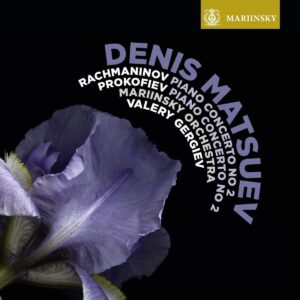As a performance, this live June 2016 Prokofiev Second piano concerto operates on the same inspired level as Denis Matsuev and Valery Gergiev’s Prokofiev Third. Matsuev is both inside and on top of the often unwieldy piano writing. The first movement’s opening solo has uncommon lilt and suppleness, and while Matsuev gives full measure to the cadenza’s busily thick textural strands, he never loses control or momentum. Crisp and witty interaction characterize the Scherzo’s perpetual motion unison piano runs and darting woodwind licks. The Intermezzo is altogether faster and lighter in texture compared to the massive deliberation of Gergiev’s earlier Mariinsky recording with pianist Alexander Toradze, while here the Allegro tempestoso finale is less clear (a matter of the present recording’s skewed sonic perspective with an overly close piano and a diffuse orchestral balance) yet far more exciting and elemental, notable in the motoric exchanges from rehearsal number 114 in the score through the meno mosso passage leading into the cadenza.
Skewed balances, however, are the bane of this Rachmaninov Second concerto, as they were in Gergiev’s DG recording with Lang Lang, but not in Gergiev’s first and best “Rach Two” featuring the teenage Evgeny Kissin and the London Symphony Orchestra. For example, the strings’ main first-movement theme ought to throb in the forefront, rather than be obliterated by the piano’s accompaniment. And when that theme recapitulates about four minutes before the movement ends, shouldn’t the string tune, the piano’s big chords, and the timpani punctuations ring out in harmonious accord, as opposed to the textural tug of war we get here? Compare this passage alongside Matsuev’s earlier recording with Alan Gilbert and the New York Philharmonic (RCA), and you’ll notice the difference.
Gergiev and Matsuev’s fleet pace for the Adagio sostenuto helps shape and define the polyrhythmic tension between solo lines and background figurations, but the Mariinsky wind soloists don’t quite share their New York colleagues’ sophisticated tonal blending and matching abilities. Likewise, the Finale’s hair-trigger soloist/orchestra interplay emerges more incisively in New York than in St. Petersburg, as the passage leading into the Fughetta reveals. During the coda’s descending interlocking chords, Matsuev slams down the pedal to ugly and vulgar effect, like a bad Horowitz caricature; the gesture proves less extreme but no less tacky in New York. In sum, the “Prok Two” is worth hearing despite sonic issues, but if you specifically need Matsuev in “Rach Two”, stick with the New York Philharmonic recording coupled with an excellent Gershwin Rhapsody in Blue. The RCA release may be hard to source on physical CD, but a download edition is readily available.
































